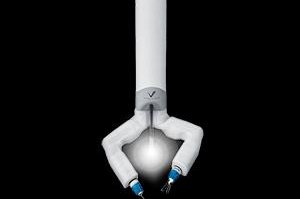1 of 2 | The MIRA robot, pictured, developed by Nebraska-based Virtual Incision and meant to perform surgery remotely, will be tested aboard the International Space Station in 2024.
Photo by Virtual Incision
Aug. 2 (UPI) -- A robot meant to perform surgery remotely will be tested aboard the International Space Station in 2024, the company behind the miniaturized in vivo robotic assistant said on Tuesday.
MIRA was developed by Virtual Incision, a Lincoln, Neb.-based company focused on development of robotic-assisted surgery devices that has been working with NASA on bringing its tools to space.
"NASA has been a long-term supporter of this research and, as a culmination of that effort, our robot will have a chance to fly on the International Space Station," the company's co-founder Shane Farritor said in a press release.
The company is aiming to have MIRA aboard the space station in 2024 for a technology demonstration.
The opportunity came after a recent NASA grant awarded to the University of Nebraska-Lincoln where Farritor is a long time professor and began developing the technology.
"The Virtual Incision MIRA platform was designed to deliver the power of a mainframe robotic-assisted surgery device in a miniaturized size, with the goal of making RAS accessible in any operating room on the planet," Virtual Incision CEO John Murphy said in a press release.
"Working with NASA aboard the space station will test how MIRA can make surgery accessible in even the most faraway places," Murphy said.
On board the space station, MIRA will operate inside a microwave-oven-sized experiment locker, performing activities meant to simulate those used in surgery, such as cutting simulated tissue and manipulating small objects.
MIRA is currently in the final stages of clinical trial testing in the United States, under an Investigational Device Exemption to eventually support market authorization by the Food and Drug Administration.
The device itself is minimally invasive and can be inserted into the human body through a small incision, with surgeons having already successfully used it to perform colon resections.
The hope is to eventually have MIRA capable of performing remote surgeries across great distances.
"NASA has ambitious plans for long-duration space travel, and it's important to test the capabilities of technology that may be beneficial during missions measured in months and years," said Farritor.
"MIRA continues to push the boundaries of what's possible in RAS, and we are pleased with its performance so far during clinical trials. We're excited to take it a step further and help identify what could be possible in the future as space travel is becoming more of a reality for mankind," Farritor said.















